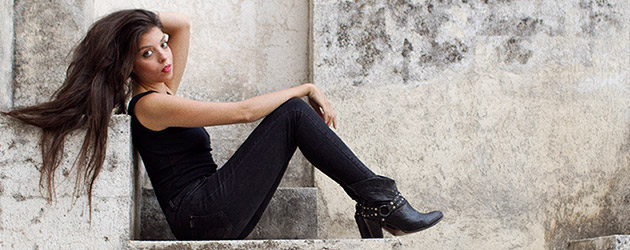Silvia Cruz Lapeña
In her first record, Enrique Morente's youngest daughter translates mixtures and formulas already tried by the man from Granada, and sets her sights on new ones in which she can hear her own voice.
Flashes of Soleá
Soleá sings better on her own. Tendrá que haber un camino (El Volcan Music, 2015), is full of relatives and friends, because she's no newcomer to this business, but this is the first time she's taken on a solo album. Soleá has flamenco right in her name and in her style of singing, and will probably turn to greater depths as time goes by, but for now, she's searching and questing because of her age, but also because she needs to dispel the memory of the death of her father, Enrique Morente.
Los Planetas, her siblings Estrella and José Enrique, her uncle Montoyita, among other artists, also take part in this work. Her father is present in every cut, even more so in two versions of Leonard Cohen that were not used on Omega. «Dama Errante» and «Esta no es Manera de Decir Adiós», interpreted as they were conceived. But these pieces, and the rest, even with lyrics by J. of Los Planetas and the Grupo de Expertos Solynieve, have the personal touch of Soleá, a certain something that is still subtle yet insinuated. In «La Ciudad de los Gitanos», with paused words and music, less rock-sounding and far removed from flamenco, this is noticeable. Also in «Oración», a song she wrote herself, where you can tell the path Soleá most longs to follow is going to have to be built.
If Enrique was ground-breaking, Soleá is a translator. Her mission is different from that of her father who invented things by breaking down barriers. Soleá saw that, and was imbued with that essence, the difference being that she comes on the scene with the frontiers already torn down. Translation is no easy task, it's more than just changing the language. Flamenco is full of people who sing wonderfully, following in the footsteps of some major star; others who play the guitar emulating the technique and speed of the greats, and people who dance by heart the tempos and acrobatics of others whom they imitate. They sing, play the guitar and dance, but they don't create. No risk is taken. Tendrá que Haber un Camino is no breakthrough or revolutionary record. It contains the «planeta» sound already tried by Morente. In that sense it's a continuation, but it is precisely the translation of Soleá, the daughter closest to Enrique and the one who takes the most risks, the one who sings predictable songs and makes them point in other directions.
Start-up disk
In «Están Bailando», which is rock sevillanas, she sings without any hang-ups, you can tell what she learned at home is a lesson well-learned, and Soleá is looking for an artistic home of her own. That's why in «Tendrá que Haber un Camino», she keeps chipping away at the rock, in the Arabic music with the Orquesta Chekara, the verses of Machado, but also in the chilly melancholy of «La Bien Querida», accounting for three pieces. But when she sings her verses, Soleá seems to be La Bien Querida. Something similar happens in the tangos «Solos tú y yo», a song in which there are moments when you don't know whether she or her sister Estrella is singing. The first situation takes her away from her throat and her diction; the second just shows how hard it is to forget family ties when you're singing. It's not a problem, and it doesn't spoil the record, which is full of bright flashes, but both songs feel as if they were lost in translation, a Soleá who is too literal. She sings better on her own, when she's translating and transmitting that which she knows, and uses her own voice, not someone else's.
This is a start-up disk, because Soleá has been on stage for years, but it's not the same to sing as to produce a recording. It's daring at times, and predictable at others, but what's noteworthy is it seems to be the harbinger of something new. People will say that other, more inexperienced artists already have a better-defined sound. But they're not the children of Morente. Soleá could have chosen to finish the record she and her father left undone, but she chose another path, more difficult and more risky. It's true she has the means, the support and the publicity, but she also has a more difficult part to play than that of her brother and sister: the world her father came from won't know how to classify her.
Like so many flamenco artists in the twenty-first century, this Morente rejects labels, more out of fear of critics for having turned her back on her heritage. Here and now I would invent all the labels: let's say she's not flamenco, let's say she is; put it all together and we come up with «Indie jondo», «flamenco rock» or whatever else strikes your fancy. And let's hope in her next record we'll have to swallow all those words and invent new ones.

